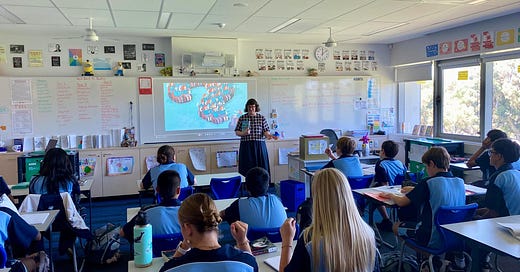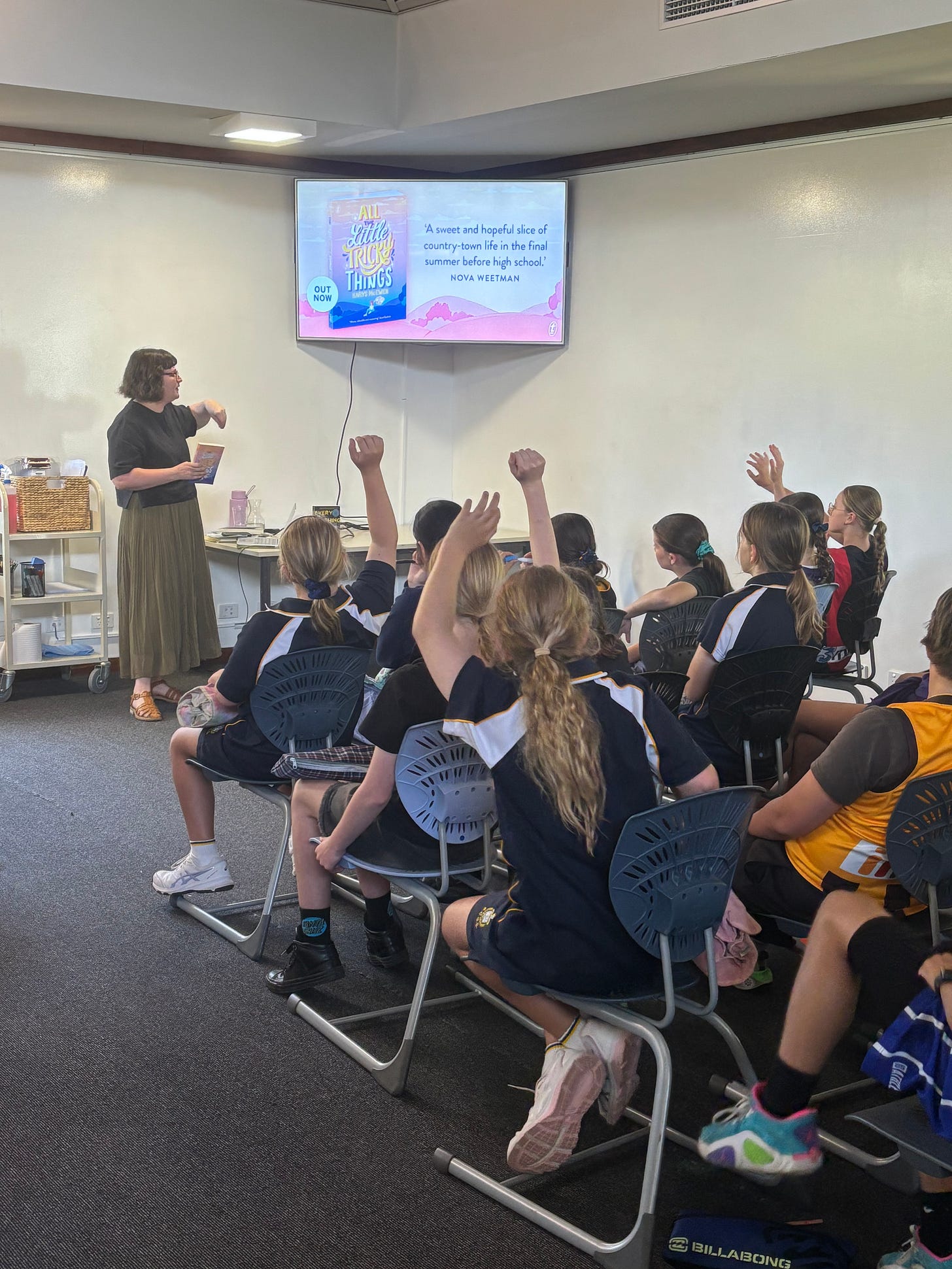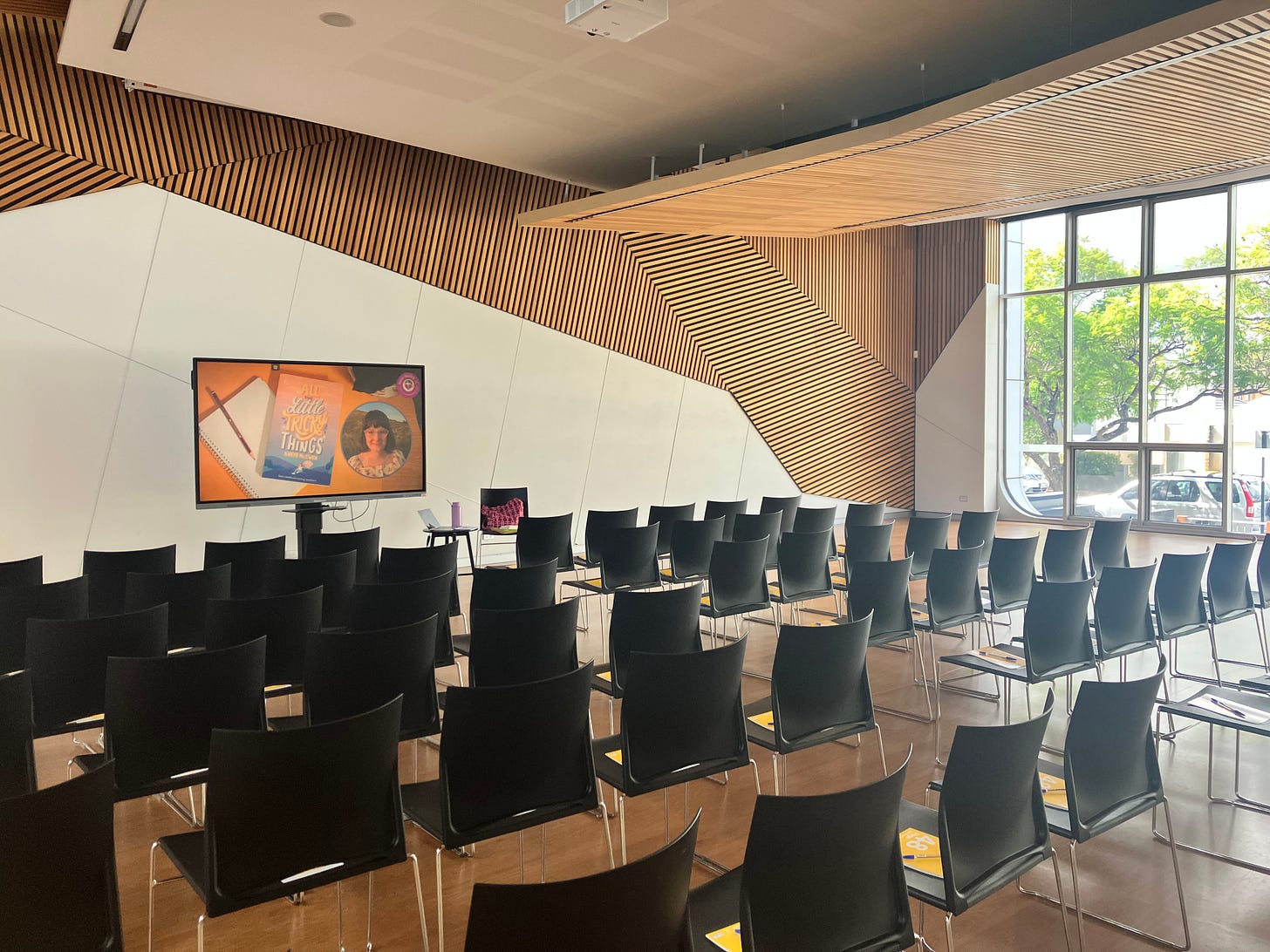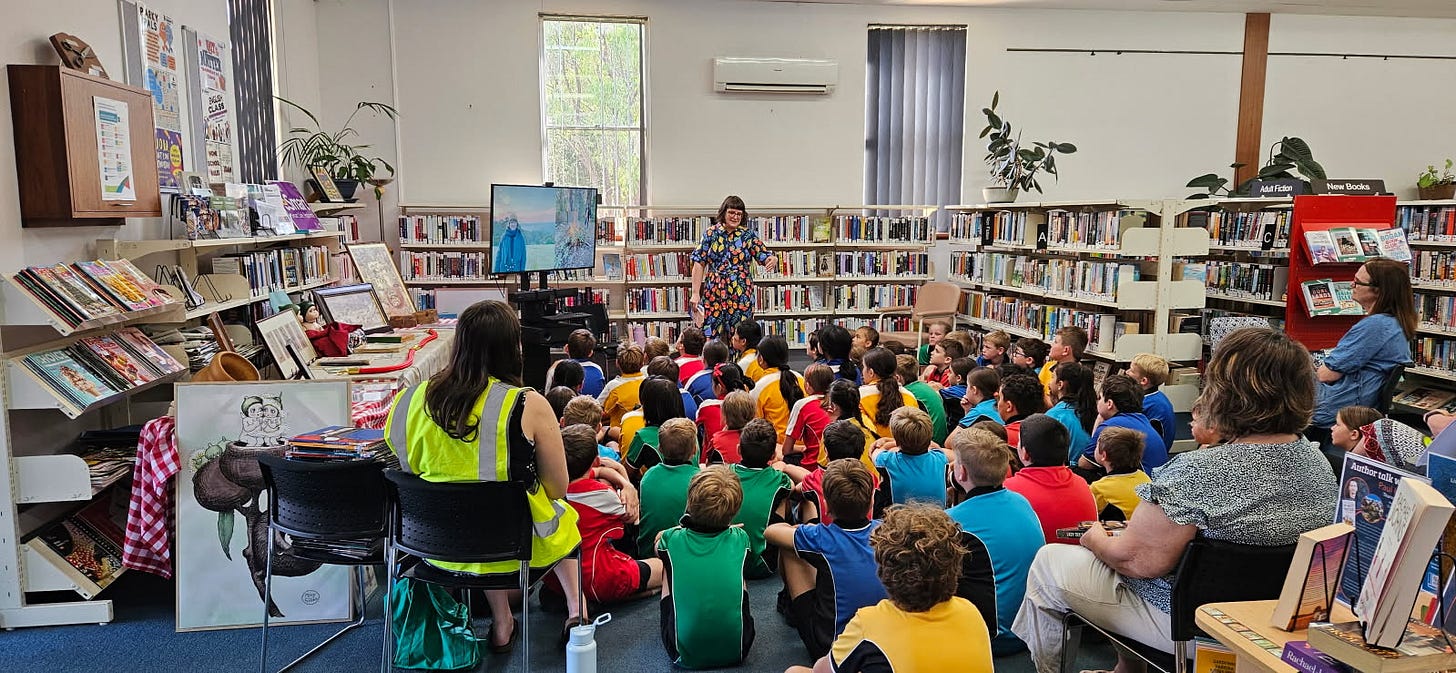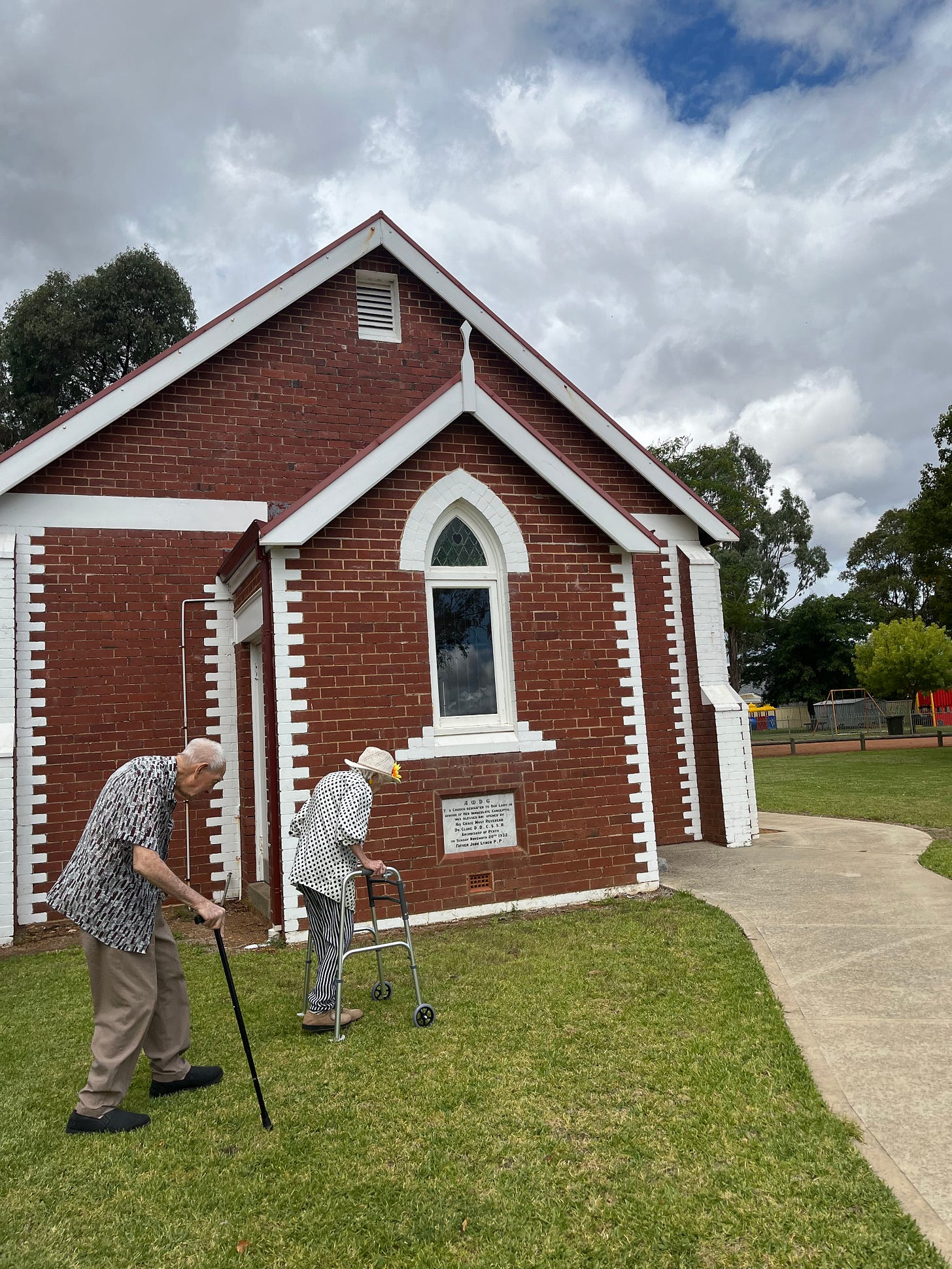Lessons from being on book tour
Two weeks, 21 events, across 10 schools and libraries. I learned a lot! Namely, don't go that hard in such a short period of time. I'm tired.
This newsletter ended up being wildly too long for email. If you’re reading directly in your email inbox, you may need to open it in the Substack app to see the whole thing.
I’ve spent the last two weeks travelling around Perth and the south west of WA (where I’m originally from), visiting schools and libraries to talk about my writing journey, my creative process, and my new book, The Paperbark Tree Committee. It was a lot of fun, quite chaotic, and completely exhausting.
I know there will be children’s authors reading this and laughing and/or rolling their eyes, because this is what they do most of the time. Hats off to them! But for me, this was my first proper ‘book tour’. When my debut novel came out in early 2022, it was still a bit COVID-y, and I was also working full time in a school, so didn’t have the capacity to tour widely. This time, since my current work situation is a little more flexible, I have been able to carve out some great opportunities to get in front of young readers. When the public library in my tiny country WA hometown invited me to present at their inaugural literary festival, I jumped on the chance, and booked two weeks worth of events to make the trip really worth it. I did all the planning myself, with a little bit of support from my publisher, but mainly just me contacting schools, locking in dates, negotiating fees, and pleading with them to put me in rooms with decent air con (WA summer is not over and I am fully Melbourne-acclimatised these days).
Below are 14 things I learned along the way. Hopefully this is helpful to any early-career authors, as well as anyone looking to organise an author talk in their school or library. Last year I wrote a post here that focused directly on that, but this time around, there’s more of a personal perspective from the other side.
Please note that all of this is just my opinion, and some of the things I have to say might contradict your own thoughts on how to best talk to kids, or welcome visiting authors. I might even change my mind on some of the below after doing more talks. That’s okay! Isn’t it? We’re all human.
And finally, you can probably already tell by this introduction, but you’ll have to forgive the rambling in today’s post. Like I said, I’m tired. (And still partially on Perth time.)
Find out as much as you can about the audience beforehand. This is my number one lesson from the tour. The best events were the ones where I was able to tailor the presentation to the kids—their current learning, their abilities, and their interests. One teacher, without me even asking, sent a very detailed list of what each group of students were currently studying and a run-down of the types of kids in each class. It was so helpful. Those talks were not necessarily the easiest, but certainly among my favourites, because I knew what I was getting into.
I actually created 21 separate slideshows, one for each of the events I did on tour. Most of them were very similar, with some slight changes that reflected what I thought the kids would be interested in, and the kind of creative writing activity might suit them. It was a lot of work but worth it. Honestly, after presenting that many times in such a short period, I was glad I didn’t have to repeat myself verbatim each time, either.
Politely ask for what you need. I can’t say how important it is for an author to speak up. Some of the schools I went to had a long list of previous visitors, and some had never had one step through their gates. My number two lesson from this trip is that it’s very acceptable to ask for something small that will help the event run more smoothly for you. I was at two different schools for entire days, and I asked both to please organise some lunch for me. Two delicious canteen meals were forthcoming. I arrived at one school only to be told that I would be speaking in their scorching undercroft area on a 38 degree day. I had to very gently tell them that I didn’t think I would be able to manage that, and they hustled to find me a different space. I ended up in the air-conditioned music room instead. (Thank goodness.)
Other schools somehow knew what I needed without me uttering a word. A principal brought me a lapel mic when he realised the room I was speaking in was just too cavernous and I shouldn’t have to shout. (I would have, but my throat would have paid for it.) One teacher quietly brought me a cup of tea between sessions, and I honestly could have kissed her. The incredible Manning Library organised for all of the kids to have notebooks and pens they could take home after the event. (Actually, some of the kids were more excited about this than meeting me, and I don’t blame them.)
Regardless, I think if you’re hosting an author, you should ask them what they need beforehand and offer some options in case they’re too shy to ask (food, mics, etc.) And as an author, you shouldn’t be too shy to ask. You’re not a total diva if you need a glass of water.
Be interactive. This is a careful balance. You’re there to give an author talk, so there will inevitably be a bit of time where the kids are required to sit and listen. (Shout out to the teacher who took me aside after one session and suggested I don’t talk as much next time…)
Most of my events were an hour long, so I tried to do 1/3 talking (with questions to the audience and other small interactions throughout), 1/3 taking Q&A from the audience, and 1/3 working on a fun creative writing exercise together. I think this worked well, for the most part! There were a few sessions where I read the room and wrapped up a little early (we did the Wordle at the end of one), or stretched out the question time, or activity, depending on the mood of the kids and the time of day. One post-lunch event seemed particularly sloggish towards the end. That’s okay! I found that sometimes I had to be a little flexible to make it work.
Organise for break days. Even just half days! I was a bit silly and spoke full time in schools and libraries for two weeks. Don’t do that, if you can avoid it. I know that for many authors, this is just a typical Children’s Book Week (and the weeks before and after) so maybe I am being a total sook, but it really was too much.
I am a fairly energetic, outgoing person, but I was certainly teetering on the edge of burnout towards the end. For me, it was all about making the most of the time and getting into as many schools that I wouldn’t normally be able to go to. I also had the double-edged sword of having my two year-old with me (and solo parenting) and also being in the same state as my entire family for once. So when I wasn’t working, I was both chasing after a toddler, and rushing around trying to spend quality time with the people I love. Fun, and important, but tiring.
Of course there are situations where you have to push up against your own limits for a bit. But I could feel myself fading by the second week, and I have to admit that on the drive to my last event, I found myself dreading it. Luckily, it ended up being my absolute favourite of the whole tour, and my spirits were quickly restored. The kids made it so worth it, and the library that organised it was a dream. (Manning Library in the City of South Perth.)
But then I went home and slept for a very, very long time.
Wear sensible shoes and makeup setting spray. This may seem obvious to any seasoned public speakers, but gee whiz, it can mean the difference between a good talk and a bad talk. Aching feet and running mascara are just not a winning combo.
Keep reading with a 7-day free trial
Subscribe to I Read A Lot to keep reading this post and get 7 days of free access to the full post archives.

